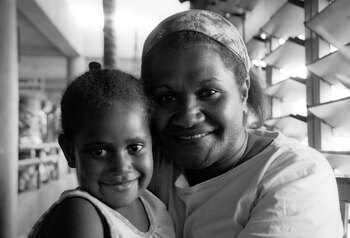At the recently completed Pacific Islands Forum in Cairns, leaders stood solemnly together and released a communiqué touting their commitment “to eradicating [sexual and gender based violence] and to ensure that all individuals have equal protection and access to justice.”
There’s an entire section in the communiqué devoted to what they coyly call SGBV. It dwells on the importance of international coordination, on continuing to maintain regional efforts to raise awareness… and of course remaining sensitive at all times to local culture and ‘differing contexts’ within the various nations.
Here’s a context I wish would differ: I wish that the young woman who greeted me at one of Vila’s marquee stores didn’t have a bruise on her jaw that had ‘left hook’ written all over it. She was at least seven months pregnant. I wish that another young acquaintance who had just given birth only days before didn’t continue to suffer through daily beatings. I wish the waitress who serves my coffee didn’t keep showing up with a black eye every month or so.
I wish the scars, the bruises, the broken teeth and bones weren’t so much part of our ‘differing context’ that we just tut-tut solemnly when we see them and carry on with our day.
[Originally published in the Vanuatu Daily Post’s Weekender Edition.]
I’m a bit of a curmudgeon when it comes to language. It’s partly because I value clear expression, partly because it’s just my nature. One of my pet peeves is the habit shown by some to co-opt certain words and phrases in order to make themselves sound smart or virtuous.
One of the most common sins is the misuse of the phrase ‘begging the question’. Begging the question is what’s known as a logical fallacy – it’s something that sounds reasonable, but uses false logic to achieve its argument. Where begging the question is concerned, the logical flaw is in the assumption behind the question. The stock example of this tactic is of a courtroom lawyer who asks the defendant, “When did you stop beating your wife?”
Now, you can see the problem here. There’s an unspoken assumption behind the question, one that we in Vanuatu know to be false: Quite obviously the defendant has never actually stopped beating his wife. The illogic is made even clearer by the laughable assumption that an abusive husband might somehow end up in court.

 A quiet revolution is taking place in North Efate.
A quiet revolution is taking place in North Efate.